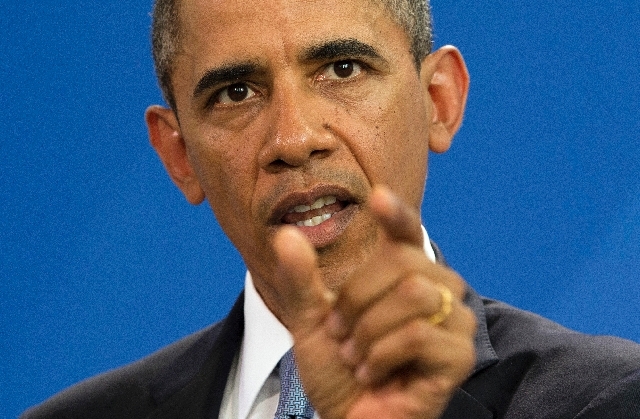Obama recasts chase for Snowden as unexceptional


WASHINGTON — The last thing President Barack Obama wants to do is turn Edward Snowden into a grand enemy of the state or a Daniel Ellsberg-type hero who speaks truth to power.
In the shifting narrative of the Obama administration, the man whose leaks of top-secret material about government surveillance programs have tied the national security apparatus in knots and brought charges under the Espionage Act has now been demoted to a common fugitive unworthy of international intrigue or extraordinary pursuit by the U.S. government.
A “29-year-old hacker,” in the words of Obama; fodder for a made-for-TV movie, perhaps, but not much more.
“This is not exceptional from a legal perspective,” the president said Thursday of Snowden’s efforts to avoid capture by hopscotching from Hawaii to Hong Kong to Russia.
“I’m not going to have one case of a suspect who we’re trying to extradite suddenly being elevated to the point where I’ve got to start doing wheeling and dealing and trading on a whole host of other issues simply to get a guy extradited,” the president told reporters in Senegal.
It was the second time in a week that the administration had toned down its rhetoric as Snowden remained out of reach and first China and then Russia refused to send him back.
Just Monday, Secretary of State John Kerry was talking tough against China and calling Snowden a traitor whose actions are “despicable and beyond description.” By Tuesday, Kerry was calling for “calm and reasonableness” on the matter, and adding, “We’re not looking for a confrontation. We are not ordering anybody.”
There are plenty of reasons for Obama to pull back, beyond his professed desire to avoid international horse-trading for the leaker.
The president, in his own words, has “a whole lot of business to do with China and Russia.” Why increase tensions in an already uneasy relationship when Obama is looking for Russia’s cooperation in finding a path to peace in Syria, for example?
In addition, less-heated dialogue could make it easier to broker Snowden’s return because, despite the latest shrugs, U.S. officials very much want him.
“There’s a lot of signaling going on,” said Steve Aftergood, director of the Project on Government Secrecy for the Federation of American Scientists. “If the White House were issuing ultimatums, then Russia might feel obliged not to cooperate. But if it’s merely one request among many others, that might make it easier to advance to a resolution.”
The president also may have a U.S. audience in mind for his comments.
Obama’s Democratic base includes plenty of defenders of civil liberties who are sympathetic to Snowden’s professed goal of making government more transparent.
Benjamin Pauker, managing editor of Foreign Policy magazine, said the president was loath to elevate Snowden to a state enemy or “an Ellsberg-type truth-teller,” referring to the 1971 leaker of the Pentagon Papers, which showed the U.S. government had misled the public about the war in Vietnam.
Ellsberg himself recently called Snowden’s revelations the most significant disclosures in the nation’s history.
The administration, though, would rather marginalize Snowden, a former National Security Agency systems analyst who is thought to have custody of more classified documents.
“Calling him a hacker, as opposed to a government contractor or an NSA employee, brings him down a notch to someone who’s an irritant, as opposed to someone who has access to integral intelligence files,” Pauker said. “To externalize him and brand him with a black-hat hacker tag distances him from the government.”
The disdainful talk isn’t just coming from the White House.
Rep. Mike Rogers, R-Mich., the chairman of the House Intelligence Committee, called Snowden “a high school dropout who had a whole series of both academic troubles and employment troubles” after a recent closed hearing on the leaks. The committee’s top Democrat, C.A. “Dutch” Ruppersberger from Maryland, called Snowden “a legend in his own mind” for claiming to be able to use NSA systems to access any email or phone call anywhere – something the NSA’s director has said can’t be done.
There may also be face-saving benefits for Obama in cutting down Snowden, who turned 30 last week. An unsuccessful full-court press for Snowden’s return would only show the limitations of Obama’s international influence.
It’s not the first time a president has tried to reset expectations by first elevating and then playing down the importance of an international fugitive who eluded capture, at least for a time.
President George W. Bush went from putting out a “dead-or-alive” ultimatum for 9-11 terror mastermind Osama bin Laden to dismissing him as “a person who’s now been marginalized.”
“I just don’t spend that much time on him,” Bush said in March 2002.
Candidate Barack Obama pledged during the 2008 presidential campaign: “We will kill bin Laden, we will crush al-Qaida. That has to be our biggest national security priority.”
By January 2009, just days before his inauguration, Obama was saying: “My preference, obviously would be to capture or kill him. But if we have so tightened the noose that he’s in a cave somewhere and can’t even communicate with his operatives, then we would meet our goal of protecting America.”
As it turned out, he got him.
—
AP Intelligence Writer Kimberly Dozier contributed to this report.













